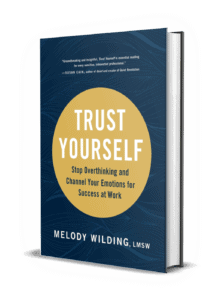Stronger boundaries at work are more important but harder to achieve than ever before as a result of the pandemic. Eighty-five percent of workers say their well-being has declined in the past year due in part to the lack of separation between work and life.
This happened to one of my coaching clients, Angie, a senior director at an advertising agency. While she excelled in her role, she struggled to disconnect at the end of the day. Work worries bled into her evenings, and she often found herself distracted by deadlines at the dinner table.
You might be like Angie, and know setting boundaries is crucial, but struggle to do so. Many of my coaching clients, professionals I refer to as sensitive strivers, are the same. As deep thinkers and feelers, they are dedicated and empathetic to a fault. They struggle to say no and take on so much that it’s hard for them to figure out where to begin setting boundaries.
A good way to start is by looking at the data from your emotional responses. There is a simple internal assessment that I created that can help. If you have one of four feelings—tension, resentment, frustration, or discomfort—it’s a sign that a boundary is needed. By addressing situations where these “four feelings” arise, you create time and space for more of what you do want and less of what you don’t.
Tension
Tension presents like a sense of pressure or strain that leads to persistent nervousness, dread, or distraction. You perceive that something at stake is dependent on the outcome of your performance. You feel responsible for a situation. For some people, this can be a positive. The ability to perform under pressure is a desirable leadership skill for a reason because it activates your attention or focus on a task.
On the flip side, unresolved tension can mean that you never allow yourself to be still, rest, or recharge because you feel that you must always be moving to meet the next benchmark (either set by others or self-imposed). The next time you start to feel this feeling arise, ask yourself: What situations trigger a feeling of dread? What wisdom is my body trying to show me about where I’m overloading myself?
Resentment
Out of all of the four feelings, this one is the biggest sign that you need to set better boundaries. Resentment is unvoiced anger. It’s a signal that an important rule, standard, or expectation in your life has been violated by somebody else (or maybe even neglected by you). It often looks like long-term, persistent bitterness, indignation, or jealousy you feel every time you think about a situation or interaction. It can also include feeling unappreciated or underrecognized.
Resentment is a choice, which means you can let go of old hurts and take steps to stand up for yourself and rectify imbalances. But, resentment makes it virtually impossible to exercise empathy or approach situations objectively. It can increase self-pity, not problem-solving. If you find yourself feeling this way, ask yourself: Where do I think I’m being treated unfairly? How can I clarify and express my expectations in a courageous way? What, if anything, do I need to work on letting go of?
FRUSTRATION
Frustration is a common feeling for many. I’d identify it as being upset, annoyed, or displeased at someone else or yourself as a result of being unable to change or achieve something or that you are feeling blocked or held back in your pursuits. It’s a clear signal that your current approach is no longer working, so it’s time to pivot. Or you’re doing the same thing over again and expecting a different result. It can also include feeling frustrated can tell you that you’re going after something that’s significant to you but that your brain believes you can be doing something better to achieve your goal. Frustration can lead you to give up and resign yourself to less than what you really want.
When you start feeling frustrated, consider: What can I control? How can I be more flexible in my approach? What small thought or behavior can I change today that will start to make a difference?
DISCOMFORT
Discomfort is a lingering or low-grade sense of uneasiness, impatience, guilt, or even embarrassment. It is usually accompanied by your intuition telling you that something isn’t right. When you feel uncomfortable, this is a signal telling you that you need to clarify what you want, then take action in that direction. Mild, intermittent discomfort can be a sign that you’re pushing and challenging yourself to try new things and experiment or can serve as a catalyst to change circumstances you’re unhappy with. But too much of this discomfort can stifle growth. Pushing yourself beyond your limits is a surefire path to exhaustion.
When you recognize that you are having feelings of discomfort, ask yourself: Where am I forcing myself to do something that I’m not okay with? What situations zap my energy or leave me feeling unsettled?
Does every situation where these four feelings arise deserve a boundary? No. But look for patterns and recurring themes. That will point you toward opportunities to create new rules and make changes so you can protect your mental and emotional energy, especially in the areas where it’s hardest to set limits: work, personal life, health, and your relationship with yourself.
Check out the Ultimate Guide for Sensitive Strivers for free resources to outsmart imposter syndrome, stop second-guessing yourself, and much more.
© 2021 Melody Wilding // originally published on Fast Company.









